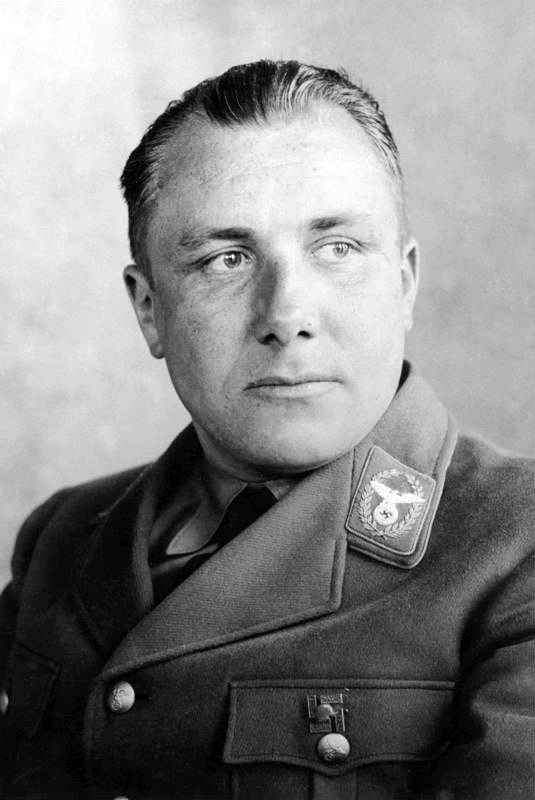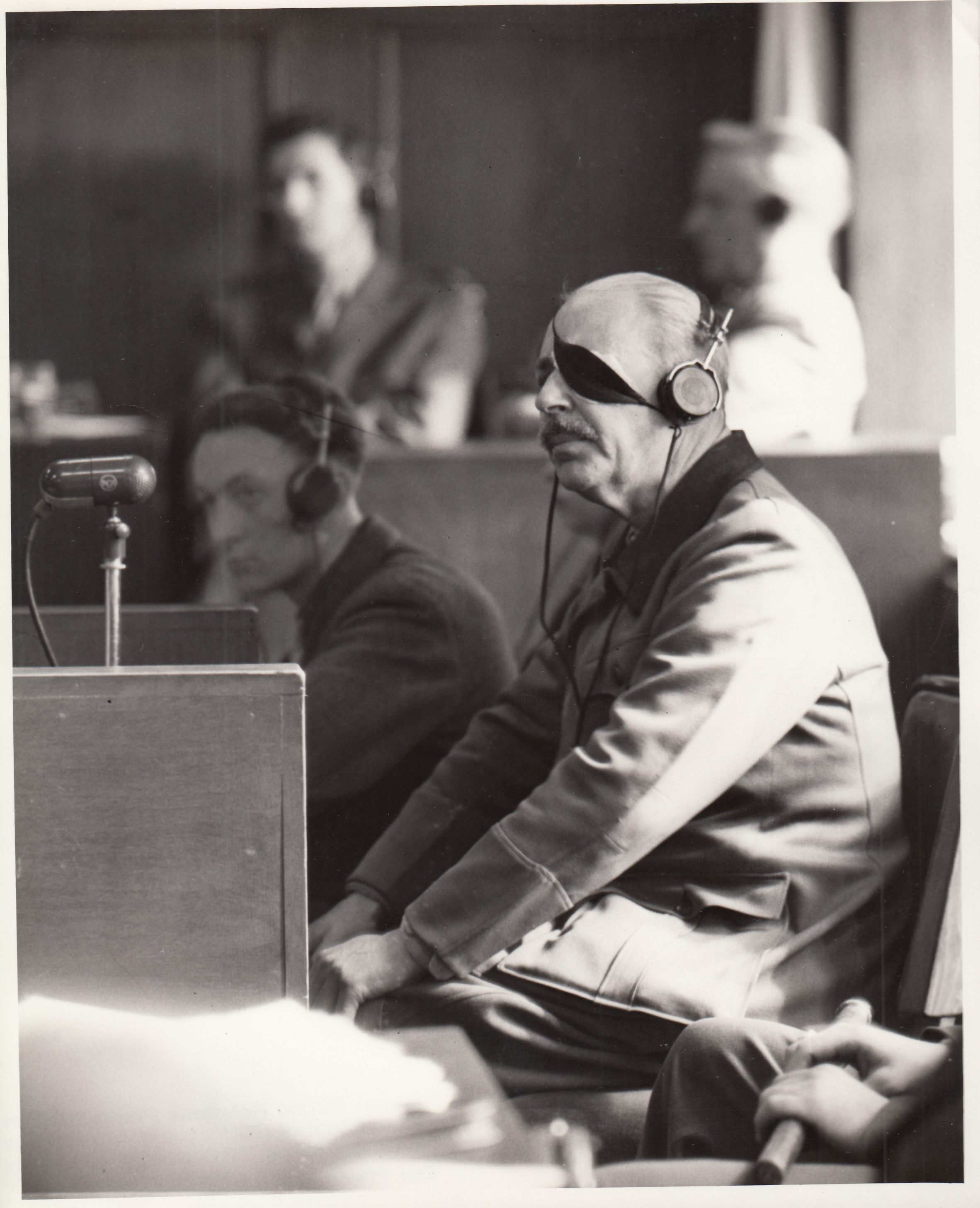National Socialist German Workers' Party Party Chancellory
The Chief of the Party Chancellory
Fuehrer's Headquarters SECRET
[Stamp] _
Circular No. 12/43g.
SECRET
Subject: Law of Self-Defense against P.O.W.'s
I acknowledge the copy of the annexed order of the Supreme Command of the Wehrmacht. .
(s) M. BORMANN
F.d.R.
Hilegardt 1 copy
Distrb. Reichsleiter
Gauleiter, ' -Verbaendefuehrer.
index cards: Prisoners of War/Guard Personnel/Self-Defense/ Physical Punishment.
Copy
Supreme Command of the Wehrmacht Berlin 29.1.1943
Az 2f 24.74 AWA/Prisoners of War. General (IA)
No. 3868 142g
SECRET
Subject: Self Defense against Prisoners of War.
Reference: None.
The question of the treatment of Prisoners of War is continually being brought up and discussed by Wehrmacht and Party
470
656-PS
bureaus, namely that the possibilities of punishment provided in the agreement of 1929 (M. Dr.-38/2) are not sufficient. Primarily neither the military punishment law nor the discipline law, which has been eliminated for German military personnel, offers a punishment which can be used with satisfactory success in case of an insubordinate and provoking attitude of Prisoners of War. The following is hereby fundamentally affirmed:
1. The M.Dr. 38/2 (Agreement 1929) article 46, states that
Prisoners of War cannot receive any other punishments than those meted out to German military personnel. That applies to all Prisoners of War with the exception of Soviet Prisoners of War. For Soviet Prisoners of War the order of the Supreme Command of the Wehrmacht 2 f 24.73 AWA/Prisoners of War, General (IA) No. 389/42g of the 24.3.1942 Article A, fourth paragraph is applicable. '
2. Improper and provoking attitude- of Prisoners of War toward German guard personnel as well as toward German contractors and workers forces and justifies this being enacted for the preservation of their own dignity and of national esteem. German law has an application for this; in the case of self-defense ST GB Art 53 is applicable. According to the existing law, self-defense occurs not only in the case of present actual attacks but also present attacks on one's honor, on one's property, etc. The law of self-defense concerns not only the party attacked, it applies also to the protection of a third party from attack. Third, in the sense of the N Art 53 a.a. G, are not only persons, but also the persons of the public and private law, as for instance the State, the municipality, society etc. The party attacked can use for protection any me'ans that the situation requires and the use of which does not contradict healthy national interest [Gesunden Volksempfinden]. A subsequent punishment of a prisoner of war for an improper and provoking attitude of physical chastisement is not permissible since self-defense is no longer present.
3. In case of the diminishing of the effort to work only the guard and the assistant guard (for example among the farmers there is very often a personal union between assistant-guard and contractor) can interfere as the military superior of the Prisoners of War. In this he is not only authorized but also obliged by duty (see Order of the OKW A2 2f 2417a Chief of Prisoners of War/ General (I)/Org (Illb) No. 2916/42 of the 26.6.1942). Should the prisoners of war not fulfill his order, then he has in the case of the most pressing need and danger,—the right to force obedience with the weapon if he has no other means. He can use the
471
656-PS
656-PS
weapon as much as is necessary to attain his goal. If the assistant guard is not armed, then, he is authorized in forcing obedience by other applicable means.
4. The military personnel, officials, and assisting guard personnel who are charged with the duty of guarding prisoners of war are to be instructed accordingly. It is to be made clear to them what means the law puts at their disposal, in order that they may be able to combat insubordinations, provocative attitudes and abatement of the will to work on the part of the prisoners of war, and what also the limits are to which they can go.
Distribution : '
D.d.R.d.A.: '
Weber
Chief of the Supreme Command of the Wehrmacht
/s/ Reinecke
- F.d.R. /s/ v. Graevenitz
Majorgeneral.
Order authorizing the use of force against POWs who act provocatively or fail to work properly
Authors
Martin Bormann (Chief, Party Chancellery, deputy to Hess, then Hitler)
Martin Bormann
German Nazi Party official and head of the Nazi Party Chancellery (1900-1945)

- Born: 1900-07-17 1900-06-17 (Halberstadt)
- Died: 1945-05-02 (Berlin)
- Country of citizenship: German Empire; Nazi Germany; Weimar Republic
- Occupation: farmer; military personnel; politician
- Member of political party: Nazi Party
- Member of: Schutzstaffel
- Participant in: Aryanization; International Military Tribunal (role: defendant; since: 1945-11-19)
- Military rank: Obergruppenführer; soldier
Hermann Reinecke (infantry general; army command staff; honorary judge, People's Court)
Hermann Reinecke
German general (1888-1973)

- Born: 1888-02-14 (Lutherstadt Wittenberg)
- Died: 1973-10-10 (Hamburg)
- Country of citizenship: Germany
- Occupation: judge; military officer; politician
- Member of political party: Nazi Party
- Participant in: Judges' Trial (date: 1947-04-29; role: affiant)
- Military rank: General of the Infantry
- Military branch: infantry
Graevenitz,von (general; chief of POW department)
Hans von Graevenitz
German general

- Born: 1894-01-01
- Died: 1963-01-01
- Occupation: military personnel
- Military rank: lieutenant general
- VIAF ID: https://viaf.org/viaf/80494666
Date: 29 January 1943
Literal Title: Subject: Law of Self-Defense against P.O.W's.
Defendant: Martin Bormann
Total Pages: 2
Language of Text: English
Source of Text: Nazi conspiracy and aggression (Office of United States Chief of Counsel for Prosecution of Axis Criminality. Washington, D.C. : U.S. Government Printing Office, 1946.)
Evidence Code: PS-656
Citation: IMT (page 2811)
HLSL Item No.: 453161
Notes:Bormann acknowledged the order, which was signed by Reinecke and Graevenitz.
Document Summary
PS-656: Secret circular letter from Bormann to the political leaders with attached secret order from the Okw (reinecke), 29 January 1943, concerning punishment of prisoners of war: discriminatory treatment of Soviet prisoners of war; application of the "right of selfdefense" against prisoners of war; punishment for decreasing efficiency in the work of prisoners of war